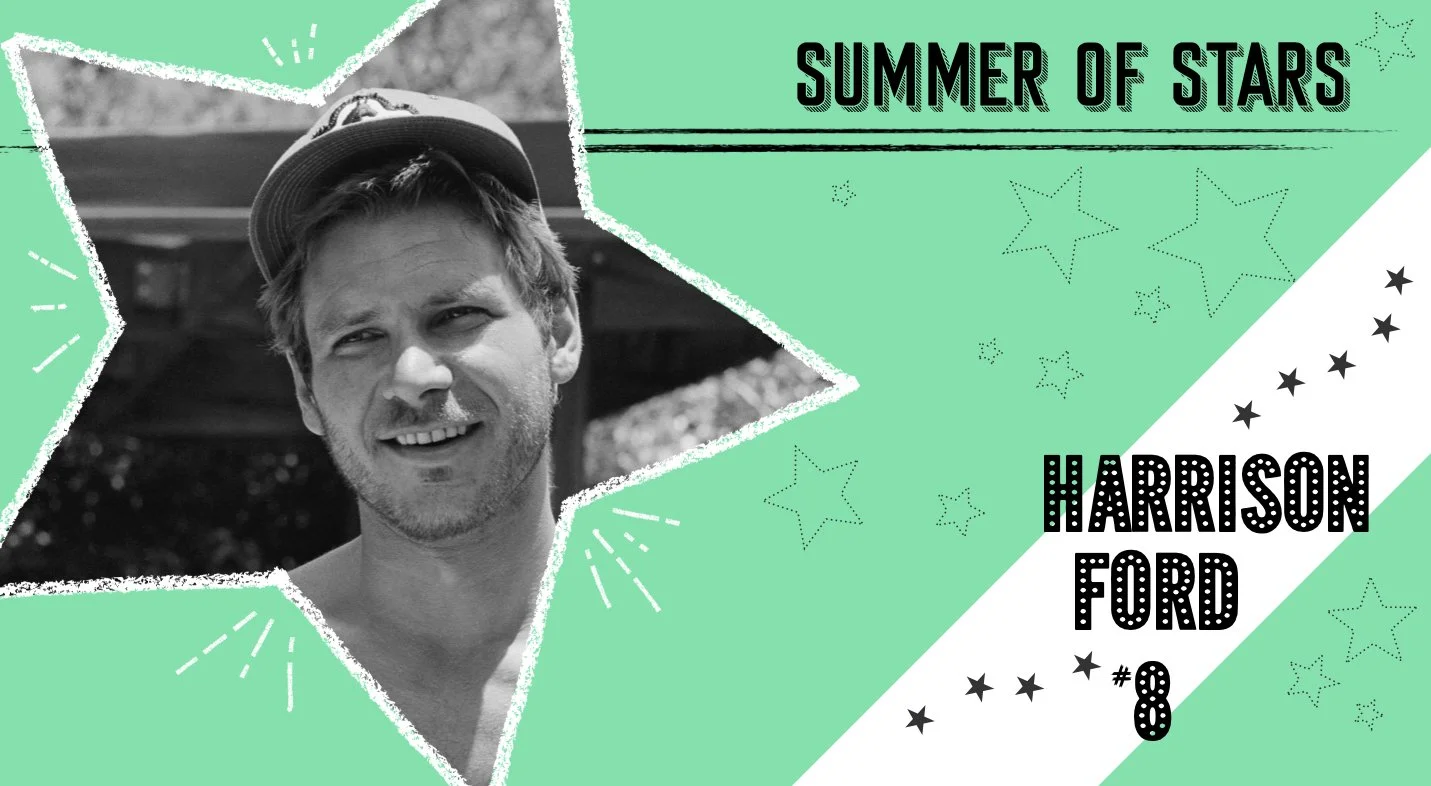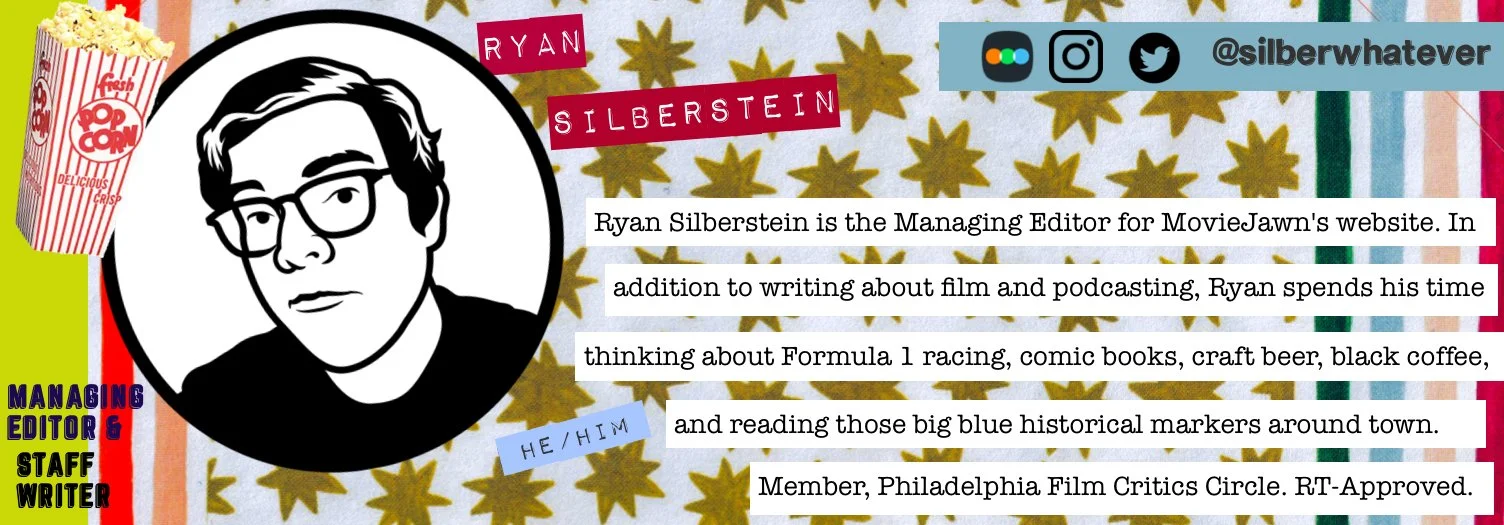SUMMER OF STARS #8: HARRISON FORD
Summer of Stars is a MovieJawn celebration of actors that have shined on the silver screen. Follow along as we count down some of our favorite players from various eras in the magical cosmos of cinema!
by Ryan Silberstein, Managing Editor, Red Herring
In some ways, Harrison Ford is the Hollywood star of the post-New Hollywood era. Working with major auteur directors like Francis Ford Coppola, George Lucas, Ridley Scott, Alan J. Paluka, Philip Noyce, and Sydney Pollack, Ford had an incredible run of movies that were both critically acclaimed and financially successful. The intersection between business and art is what makes Hollywood what it is, and from 1980 to 1997, Harrison Ford was one of its crown jewels. Coming of age in that time period, where Ford had an incredible run of starring roles in multiple franchises (Star Wars, Indiana Jones, Jack Ryan) he was the actor. Indiana Jones was one of my earliest cultural imprints, and so Ford’s work has been a part of my life for as long as I can remember. But I wanted to focus on his collaborations with one of my favorite directors, Peter Weir, in their back-to-back films Witness and The Mosquito Coast. Both movies play on Ford’s “everyman” persona in service of Weir’s fascination with culture clash, previously seen in the director’s work The Last Wave and The Year of Living Dangerously.
In Witness, Harrison Ford plays Philadelphia Detective John Book who hides out in an Amish community near Lancaster, Pennsylvania to protect a small boy who has witnessed a murder by a corrupt cop. While doing his best to blend in with the Amish, Book demonstrates respect for the community and their traditions, all the while being intensely attracted to the boy’s mother, Rachel (Kelly McGillis). While Witness is an engaging thriller, a plot-forward description omits much of the movie’s charms. In the words of Roger Ebert, “it's so much more than a thriller that I wish they hadn't even used the word "murder" in the ads. This is, first of all, an electrifying and poignant love story.”
But it’s more than that, too. Witness is downright erotic. Not an “erotic thriller,” but Weir depicts much of the romance through the visual language. Emphasis on facial expressions and body language say more than dialogue, and the differences in culture and morals are eclipsed by physical desire and intimate connection. The emphasis on bodies and faces helps place the audience firmly in the world of the Amish, where communication and labor are slower and more manual. For John Book, this changes his outlook, leaving him calmer and more humble, but not at the cost of his passion or desire for justice. This body-forward filmmaking extends to the end of the film, when Weir declined to shoot a scene where John and Rachel talk about their feelings, not aiming for ambiguity but for a more impactful conclusion without direct dialogue. Witness remains Harrison Ford’s only Oscar nomination for acting, and looking back it is easy to see why this performance broke through (the fact that he didn’t get an ‘elder statesman’ nomination for either The Force Awakens or Blade Runner 2049 is wild when you think about Ingrid Bergman in Murder On the Orient Express). Harrison Ford is an everyman who becomes changed by his experience with the Amish in a way that feels genuine and minimally exploitative.
In The Mosquito Coast, however, Peter Weir deploys Ford’s natural charisma in a much more ironic way. Here, he plays inventor Allie Fox, a man so disillusioned with the consumerist parts of the American Dream that he relocates his family to Central America. There he purchases a town, builds an ice machine that would impress even Gilligan’s Island’sThe Professor, and attempts to turn his town into a utopia. Things do not go well for anyone, and what begins as an anti-capitalist Swiss Family Robinson dream quickly sours into a Augirre, Wrath of God nightmare dystopia as Allie becomes increasingly obsessive over his goals and distant from his family. He pollutes the river, and takes more and more extreme measures to try to bring his vision to life. While Allie’s worldview is anti-consumerism and anti-religion, The Mosquito Coast shows that his top down view of how to ‘civilize’ the local population is barely different from that of the Christian missionaries who are also working in the area.
Written by Paul Schrader, it fits in with the other dark character portraits he’s penned and directed over the years. While Allie’s aims and ideas may be sympathetic, the cost of becoming a dictator is too high for his family. HIs children come to hate him, especially Charlie (River Phoenix), the film’s narrator. His wife (Helen Mirren) seems to be resigned to Allie running this jungle town the same way he runs their household, from on high and leaning into crusades of the mind rather than solving real problems. As Robert Daniels writes, “Ford seems to revel in deconstructing his perfect dad image for villainous effect.”
The Mosquito Coast is one of Ford’s only unsuccessful films between 1977 and 1997, but it offers one of his most intense and disturbing performances. While some critics, notably Roger Ebert, found Allie detestable from the film’s start, when I watched the film recently, I found him sympathetic at the beginning of the film, and his quest to leave behind consumer culture for something more “pure” was relatable. But while my ideal of ice machines in technology untouched environments is a lot closer to Doc Brown in Back to the Future Part III than it is to cultural colonialism, I still find the impulse of trying to bring the technological fruits of the 20th century while trying to decouple it from its capitalistic origins noble, if not hopelessly misplaced. For me, I am on board with giving Allie a chance until the negative effects on the local population and the rest of the Fox family become clear, not to mention Allie’s total disregard for the concept of ‘sunk costs.’ I don’t even mind him lying about America having been destroyed in a nuclear apocalypse. Such is the charm of Harrison Ford.




